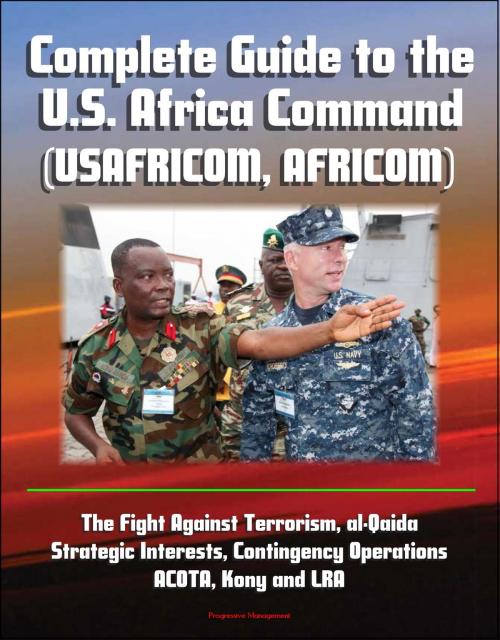Complete Guide to the U.S. Africa Command (USAFRICOM, AFRICOM) - The Fight Against Terrorism, al-Qaida, Strategic Interests, Contingency Operations, ACOTA, Kony and LRA
Nonfiction, Travel, Africa, History, Military, United States| Author: | Progressive Management | ISBN: | 9781301831326 |
| Publisher: | Progressive Management | Publication: | August 14, 2013 |
| Imprint: | Smashwords Edition | Language: | English |
| Author: | Progressive Management |
| ISBN: | 9781301831326 |
| Publisher: | Progressive Management |
| Publication: | August 14, 2013 |
| Imprint: | Smashwords Edition |
| Language: | English |
The emerging role of the recently formed U.S. Africa Command is explored in this comprehensive ebook featuring a wide-ranging compilation of official documents.
On February 6, 2007, the Bush Administration announced the creation of a new unified combatant command, U.S. Africa Command or AFRICOM, to promote U.S. national security objectives in Africa and its surrounding waters. Prior to AFRICOM's establishment, U.S. military involvement on the continent was divided among three commands: U.S. European Command (EUCOM), U.S. Central Command (CENTCOM), and U.S. Pacific Command (PACOM). The command's area of responsibility (AOR) includes all African countries except Egypt. AFRICOM was officially launched as a sub-unified command under EUCOM on October 1, 2007, and became a stand-alone command on October 1, 2008.
As envisioned by the Department of Defense (DOD), AFRICOM aims to promote U.S. strategic objectives by working with African states and regional organizations to help strengthen regional stability and security through improved security capability and military professionalization. If directed by national command authorities, its military operations would aim to deter aggression and respond to crises.
DOD signaled its intention to locate AFRICOM's headquarters on the continent early in the planning process, but such a move is unlikely to take place for several years, if at all. The command will operate from Stuttgart, Germany, for the foreseeable future. DOD has stressed that there are no plans to have a significant troop presence on the continent. The East African country of Djibouti, home to the Combined Joint Task Force-Horn of Africa (CJTF-HOA) at Camp Lemonnier, provides the U.S. military's only enduring infrastructure in Africa.
The 1998 bombing of U.S. embassies in East Africa and more recent attacks have highlighted the threat of terrorism to U.S. interests on the continent. Political instability and civil wars have created vast ungoverned spaces, areas in which some experts allege that terrorist groups may train and operate. Instability also heightens human suffering and retards economic development, which may in turn threaten U.S. economic interests. Africa's exports of crude oil to the United States are now roughly equal to those of the Middle East, further emphasizing the continent's strategic importance. One of the reports in this compilation provides a broad overview of U.S. strategic interests in Africa and the role of U.S. military efforts on the continent as they pertain to the creation of AFRICOM. A discussion of AFRICOM's mission, its coordination with other government agencies, and its basing and manpower requirements is included.
The emerging role of the recently formed U.S. Africa Command is explored in this comprehensive ebook featuring a wide-ranging compilation of official documents.
On February 6, 2007, the Bush Administration announced the creation of a new unified combatant command, U.S. Africa Command or AFRICOM, to promote U.S. national security objectives in Africa and its surrounding waters. Prior to AFRICOM's establishment, U.S. military involvement on the continent was divided among three commands: U.S. European Command (EUCOM), U.S. Central Command (CENTCOM), and U.S. Pacific Command (PACOM). The command's area of responsibility (AOR) includes all African countries except Egypt. AFRICOM was officially launched as a sub-unified command under EUCOM on October 1, 2007, and became a stand-alone command on October 1, 2008.
As envisioned by the Department of Defense (DOD), AFRICOM aims to promote U.S. strategic objectives by working with African states and regional organizations to help strengthen regional stability and security through improved security capability and military professionalization. If directed by national command authorities, its military operations would aim to deter aggression and respond to crises.
DOD signaled its intention to locate AFRICOM's headquarters on the continent early in the planning process, but such a move is unlikely to take place for several years, if at all. The command will operate from Stuttgart, Germany, for the foreseeable future. DOD has stressed that there are no plans to have a significant troop presence on the continent. The East African country of Djibouti, home to the Combined Joint Task Force-Horn of Africa (CJTF-HOA) at Camp Lemonnier, provides the U.S. military's only enduring infrastructure in Africa.
The 1998 bombing of U.S. embassies in East Africa and more recent attacks have highlighted the threat of terrorism to U.S. interests on the continent. Political instability and civil wars have created vast ungoverned spaces, areas in which some experts allege that terrorist groups may train and operate. Instability also heightens human suffering and retards economic development, which may in turn threaten U.S. economic interests. Africa's exports of crude oil to the United States are now roughly equal to those of the Middle East, further emphasizing the continent's strategic importance. One of the reports in this compilation provides a broad overview of U.S. strategic interests in Africa and the role of U.S. military efforts on the continent as they pertain to the creation of AFRICOM. A discussion of AFRICOM's mission, its coordination with other government agencies, and its basing and manpower requirements is included.















